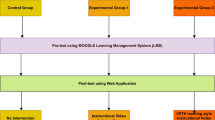Abstract
Teaching and learning complex fields of knowledge, including engineering, is rarely easy, particularly because of rapid changes and high interdependences among different topics. In addition, learners are increasingly heterogeneous in terms of different experiences and levels of knowledge. Not dealing with increasingly heterogeneous learners appropriately may result in high dropout rates and poor training quality. A possible way out is addressing learners more individually. Hopefully, digital learning offers, such as video platforms, will help to convey knowledge better and more individually through a broader learning offer. But learners with different levels of knowledge need different starting points into a course based on their level of knowledge. Thus, a crucial problem is finding the most appropriate starting point for learners in such environments. This paper presents a novel approach to identify individual starting points in online video courses for learners with different levels of knowledge. The underlying algorithm identifies topics that are most useful for the concrete learner at the beginning of the course in order to introduce a new field of knowledge appropriately.
Access this chapter
Tax calculation will be finalised at checkout
Purchases are for personal use only
Similar content being viewed by others
References
Hanft, A.: Heterogene Studierende – homogene Studienstrukturen. In: Hanft, A., Zawacki-Richter, O., Gierke, W.B. (eds.) Herausforderung Heterogenität beim Übergang in die Hochschule, pp. 13–28. Waxmann, Münster, New York (2015)
Röwert, R., Lah, W., Dahms, K., Berthold, C., von Stuckrad, T.: Diversität und Studienerfolg - Studienrelevante Heterogenitätsmerkmale an Universitäten und Fachhochschulen und ihr Einfluss auf den Studienerfolg - eine quantitative Untersuchung, 198th edn. CHE Arbeitspapier. Centrum für Hochschulentwicklung gGmbH, Gütersloh (2017)
Diwanji, P., Simon, B.P., Marki, M., Korkut, S., Dornberger, R.: Success factors of online learning videos. In: 2014 International Conference on Interactive Mobile Communication Technologies and Learning (IMCL), Piscataway, NJ, pp. 125–132. IEEE (2014)
Ricci, F., Rokach, L., Shapira, B.: Introduction to recommender systems handbook. In: Ricci, F., Rokach, L., Shapira, B., Kantor, P.B. (eds.) Recommender Systems Handbook, vol. 23, pp. 1–35. Springer, Boston (2011)
Davies, J.: Lightweight ontologies. In: Poli, R., Healy, M., Kameas, A. (eds.) Theory and Applications of Ontology: Computer Applications, vol. 46, pp. 197–229. Springer, Dordrecht (2010)
Klašnja-Milićević, A., Ivanović, M., Nanopoulos, A.: Recommender systems in e-learning environments: a survey of the state-of-the-art and possible extensions. Artif. Intell. Rev. 44, 571–604 (2015)
Manouselis, N., Drachsler, H., Verbert, K., Santos, O.C. (eds.): Recommender Systems for Technology Enhanced Learning. Research Trends and Applications. Springer, New York (2014)
Aparecido Gotardo, R., Rafael, E., Junior, H., Donizetti Zorzo, S., Massa Cereda, P.R.: Approach to cold-start problem in recommender systems in the context of web-based education. In: 2013 12th International Conference on Machine Learning and Applications, pp. 543–548. IEEE (2013)
Bobadilla, J., Ortega, F., Hernando, A., Bernal, J.: A collaborative filtering approach to mitigate the new user cold start problem. Knowl.-Based Syst. 26, 225–238 (2012)
Kuznetsov, S., Kordik, P., Rehorek, T., Dvorak, J., Kroha, P.: Reducing cold start problems in educational recommender systems. In: 2016 International Joint Conference on Neural Networks (IJCNN), pp. 3143–3149. IEEE (2016)
Giannakos, M.N., Aalberg, T., Divitini, M., Jaccheri, L., Mikalef, P., Pappas, I.O., Sindre, G.: Identifying dropout factors in information technology education: a case study. In: 2017 IEEE Global Engineering Education Conference (EDUCON), pp. 1187–1194. IEEE (2017)
Gruber, T.R.: A translation approach to portable ontology specifications. Knowl. Acquisition 5(2), 199–220 (1993)
Guarino, N., Oberle, D., Staab, S.: What is an ontology? In: Staab, S., Studer, R. (eds.) Handbook on Ontologies, vol. 5, pp. 1–17. Springer, Heidelberg (2009)
Author information
Authors and Affiliations
Corresponding author
Editor information
Editors and Affiliations
Rights and permissions
Copyright information
© 2021 The Author(s), under exclusive license to Springer Nature Switzerland AG
About this paper
Cite this paper
Lehmann, A. (2021). Adaptive Starting Points in Video Learning Environments for New Learners Based on Video and Topic Tree Relations. In: Auer, M.E., Rüütmann, T. (eds) Educating Engineers for Future Industrial Revolutions. ICL 2020. Advances in Intelligent Systems and Computing, vol 1329. Springer, Cham. https://doi.org/10.1007/978-3-030-68201-9_80
Download citation
DOI: https://doi.org/10.1007/978-3-030-68201-9_80
Published:
Publisher Name: Springer, Cham
Print ISBN: 978-3-030-68200-2
Online ISBN: 978-3-030-68201-9
eBook Packages: Intelligent Technologies and RoboticsIntelligent Technologies and Robotics (R0)




